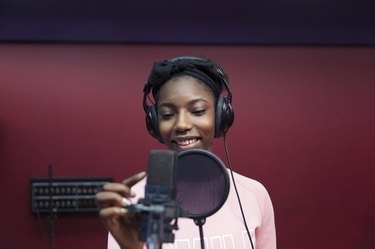
Wedding toasts, presentations and interviews are only some of the many situations in which you'll want to put your best voice forward. That's where voice training exercises come in. Working your voice to vocal perfection takes work and starts with the correct breathing techniques. Get your vocal workout jump-started with vocal training videos, a voice coach, or acting and singing classes.
Why Do Breathing Exercises?
Video of the Day
Breathing properly can make all the difference when it comes to strengthening your voice. NPR voice coach Jessica Hansen says that starting with a breath helps the ribs loosen up. Breathing correctly can infuse your speech with energy and range.
Video of the Day
Preston Ni, a professor and private voice coach, also believes in the power of breath in voice training. He believes that breathing the right way by inhaling and letting your belly rise and exhaling and letting your belly fall, can sharpen us cognitively and help us de-stress.
Exercises to Combat Vocal Fry
Vocal fry, also referred to as "valleyspeak" or "creaky voice," occurs when there's too much stress on the vocal folds. Avoiding vocal fry means keeping the voice more forward and out of your throat. NPR's Hansen recommends a couple of ways to keep the voice forward and resonant.
- Humming: Hum your way to a stronger voice. The more tingly your lips are while you hum, the more likely you're doing it correctly.
- Meowing: Hansen recommends reading a sentence, meowing, then re-reading the sentence. This exercise should bring your voice to the front and make a difference in the way you sound.
Steps to a Better Voice
Training your voice doesn't just happen overnight. It takes work and determination (and the right foods couldn't hurt). Getting started might require a push in the right direction. Ni recommends taking an acting or singing class to begin your vocal warm-ups.
The communication expert also recommends working with a private voice coach in order to get the necessary tools for improving your voice. He stresses the importance of diaphragmatic breathing, in which you project from your diaphragm.
In addition to dedication and taking the right steps, improving the sound of your voice requires good posture. The New York Film Academy recommends keeping the posture straight, yet relaxed. The body should be upright and the crown of the head parallel to the ceiling. This supports the respiratory system so the body can function normally.
Read more: How to Fix the Worst Posture Mistakes
Vocal Training Exercises
A voice exercise guide from the New York Film Academy suggests certain exercises to help warm up your muscles and reduce vocal strain:
- Tongue stretch: Stick your tongue out and point it up and down, then position the tongue behind the bottom front teeth and push out. Next massage the jaw and face muscles to relieve tension. You can also stretch your neck by lightly leaning front, back and to the sides.
- Make certain sounds: Sticking your tongue out and panting (like a dog) will help open up your breath. You can also exercise the cheeks and lips by flapping your lips and producing air. This will make a "BEE" or a "BRR" sound.
- Yawn stretch: While yawning, try to smile and make a sighing sound.
- Text work: Read or recite a certain text aloud and focus on your breath. Go over the text aloud in different types of voices, whispering and speaking loudly.